Upgrade, a prominent fintech company, is disrupting the conventional student loan model through its innovative Income-Sharing Agreements (ISAs). Unlike fixed monthly payments, students opt for a percentage-based repayment tied to their future income. This groundbreaking approach introduces a flexible and equitable financing solution for education.
The traditional student loan model often burdens graduates with fixed monthly payments, irrespective of their post-graduation income. Upgrade’s ISAs represent a paradigm shift, aligning the cost of education with individual financial circumstances. By tying repayments to future income, students face a more manageable financial commitment, especially during the initial stages of their careers.
The flexibility of Upgrade’s ISAs addresses the financial challenges students commonly encounter after graduation. As income varies, so do the repayments, creating a more adaptable and personalized repayment structure. This model ensures that graduates contribute a reasonable portion of their income, making education financing more sustainable and tailored to individual financial capacities.
Moreover, Upgrade’s approach fosters a sense of shared responsibility between the lending institution and students. The success of ISAs depends on the success of the graduates, aligning the interests of the lender with the financial well-being of the borrowers. This symbiotic relationship introduces a level of fairness and mutual benefit often absent in traditional lending models.
The innovation of Upgrade’s ISAs extends beyond financing solutions; it reflects a broader shift in the financial industry toward more inclusive and dynamic approaches. This model acknowledges the evolving nature of work, providing graduates with financial flexibility while mitigating the financial risks associated with traditional student loans.
However, it’s essential to note that the success of income-sharing agreements hinges on proper regulation, transparency, and ethical practices. Striking the right balance between protecting students’ interests and ensuring the viability of this financing model is crucial for its sustained success.
By prioritizing flexibility, equity, and shared responsibility, Upgrade’s ISAs offer a promising alternative to traditional student loans, potentially alleviating financial burdens for graduates and fostering a more sustainable model for financing higher education.





